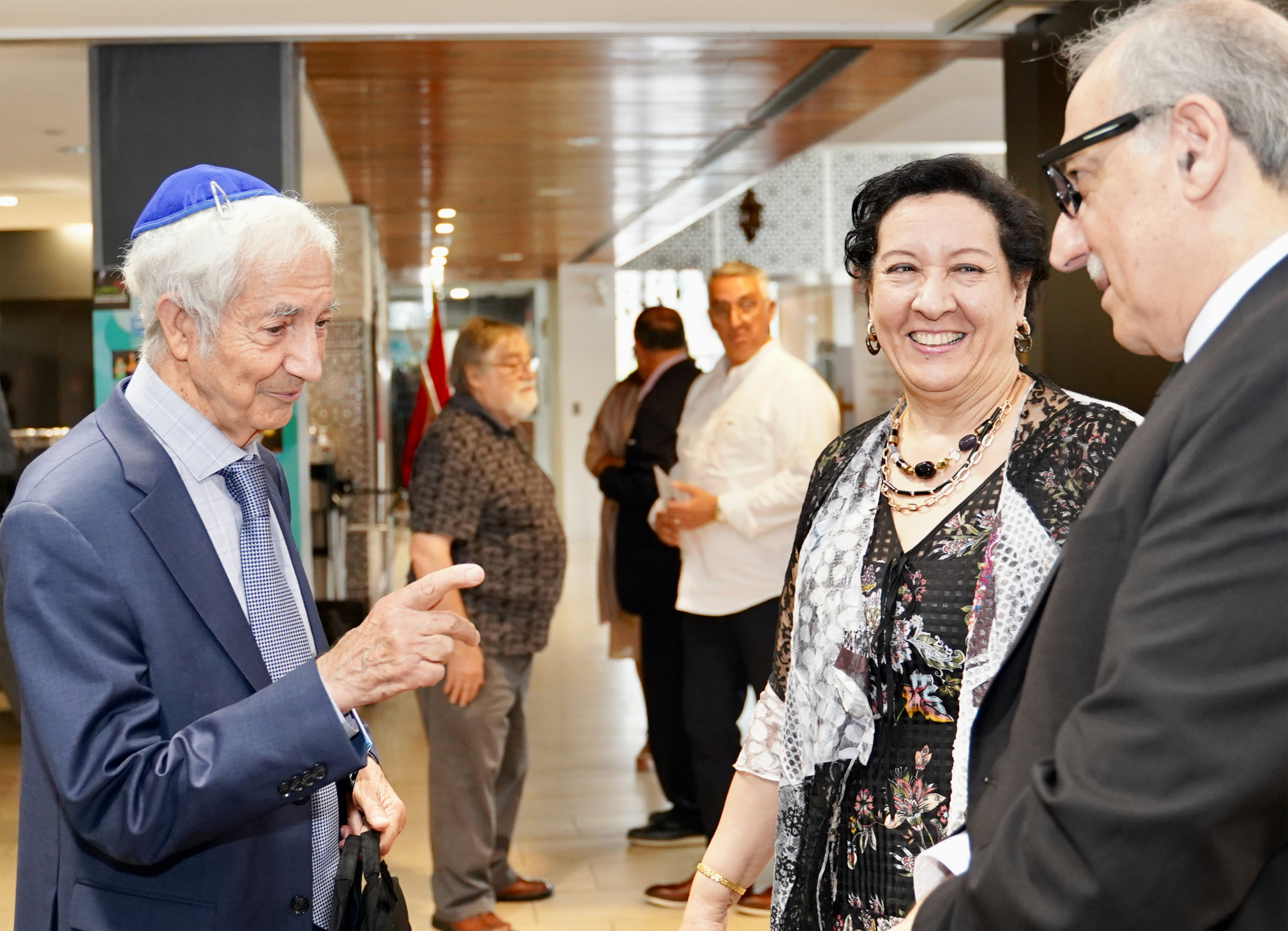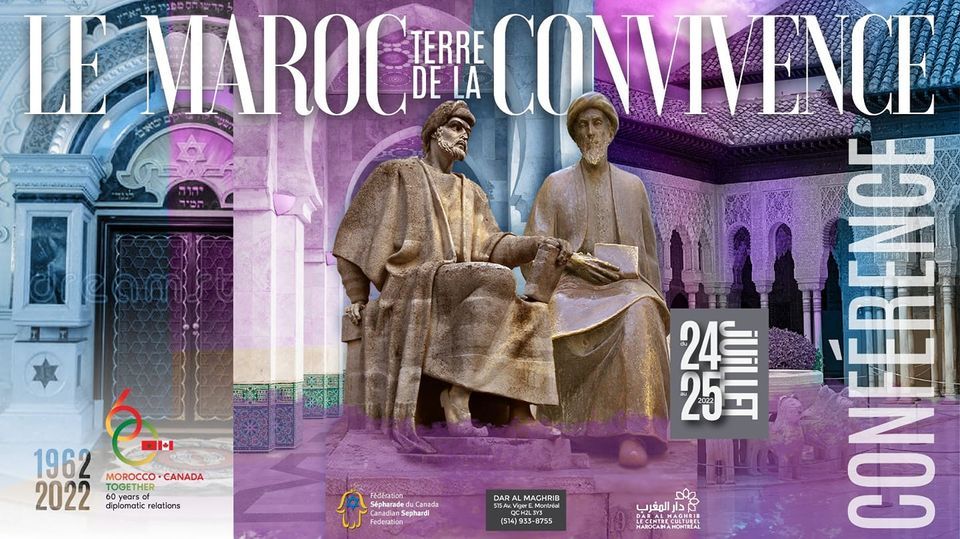Le Maroc: Terre de la Convivence, the title of a two-day gathering of Jews and Muslims of Moroccan origin, sums up its message that the country was and is a land of peaceful co-existence.
Academics, religious officials and community leaders from Canada, Morocco, Israel and France participated in the conference held July 24-25 at the Dar Al Maghrib Moroccan Cultural Centre with the Canadian Sephardi Federation (CSF).
They repeatedly affirmed that the country’s Jewish heritage is cherished by Morocco and that Jews are regarded as “brothers” by the Muslim majority.
The conference poster is a photo of statues in Cordoba, Spain of two native sons, the revered 12th-century philosophers and polymaths, Maimonides and Ibn Rushd—one Jewish, the other Muslim. The sculptures in separate locations are depicted together to convey the spirit of the conference.
A portrait of Morocco’s sovereign, Mohammed VI, and the green star of the Moroccan flag, representing Islam’s five pillars, were displayed on the stage.
CSF president Avraham Elarar described the conference to The CJN as “the culmination of many years of work to promote dialogue (locally and internationally). It sends the signal that Morocco is a model for the Arab world to follow.”
The agreement in December 2020 by Israel and Morocco to normalize relations has given impetus to long-standing efforts by Elarar to find common ground for the people of the country where he grew up.
The CSF and Dar Al Maghrib eschewed the word “tolerance,” preferring convivence, which suggests a mutual and welcomed relationship.
Jewish law in Morocco and, specifically, the recognized authority of rabbinical courts over the centuries up to the present, was the focus of the conference.
Founding president Prof. Abdellah Ouzitane spoke about the Centre for Study and Research on Hebraic Law in Morocco (CSRHLM), which was created in 2018 at Bayt Dakira (House of Memory), a Jewish museum in Essaouira, to explore this history.
Ouzitane was among the group of Moroccan scholars who participated in a conference at Bar-Ilan University’s Sephardic studies centre in November, the first such exchange since the normalization of relations.
Another speaker was Prof. Farid El Bacha, dean of legal sciences at Mohammed V University Rabat, a co-sponsor of the event, who is the CSRHLM’s executive president and director of a new chair in Hebraic law at that university.
This respect for Judaism was demonstrated when Rabbi David Sabbah, head of the Grand Rabbinat du Québec for more than 40 years and originally from Rabat, was given two standing ovations after he blessed the conference.
Rabbi Moise Ohana, spiritual leader of Congregation Or Hahayim since 1978, said, “Our country of origin will always remain in our hearts.”
Moroccan Jews, wherever they live today, can be “ambassadors” of the openness and harmony they knew in Morocco, he said.

Haim Cohen, president of the World Sephardi Federation in Israel, with whom the CSF collaborates on intercultural exchanges, spoke in Hebrew. Arabic was heard in a recorded speech by Imam Mohammed Amin Ismaili, who emphasized that under its royal rulers, Morocco has protected its Jewish citizens, including from the Nazis during the Second World War.
Moroccan Ambassador Souriya Otmani delivered a message on behalf of the kingdom, underlining the priority Mohammed VI gives pluralism.
Elarar told The CJN that Israeli Ambassador Ronen Hoffman was invited but sent regrets that he could not attend. Both embassies were listed as partners in the conference.
In his remarks, Elarar explained why the word “tolerance” was avoided. “Only adherence to the philosophy of convivence allows mutual intellectual and cultural cross-fertilization between equals in a multi-confessional society. Tolerance, in the best of cases, hardly prevents inter-confessional conflict.”
Elarar, who lives in Vancouver, became CSF president four years ago. In an interview after the conference’s first day, he related that his family moved to Israel in 1962 when he was a child – “not because we were kicked out, we were not refugees, but because my father was a true Zionist.”
A naval officer, he fought in the Yom Kippur War, immigrating to Canada in 1977.
Elarar has no doubt that his Muslim interlocutors are sincere in wanting closer relations, or that Jews of Moroccan heritage maintain an affinity to that country.
That the Moroccans are giving so much attention to a Jewish community that today numbers only about 1,800 and that Muslim scholars are devoting themselves to Jewish law, for example, speaks to a genuine regard, he said.
Israel’s relationship with Morocco is different, he believes, than the situation in the six other Muslim states where it has formal peace agreements. Egypt and Jordan remain a “cold peace”, while there is little Jewish presence in the countries that have signed the Abraham Accords.
‘’This is a warm peace, almost an alliance,” said Elarar. “About a million Israelis have Moroccan ancestry. This is an accord that comes from the bottom, not the top.”
On the second day, conference participants toured the Montreal Holocaust Museum where they heard from survivor Rachel Gropper.
They also visited Concordia University’s Multi-Faith and Spirituality Centre. In April Dar Al Maghrib and Concordia signed a memorandum of understanding for greater exchanges in a variety of areas of interest to Morocco and Canada.
There is a wish that this protocol be expanded to include Mohammed V University, the CSRHLM, and the CSF, said Elarar.









